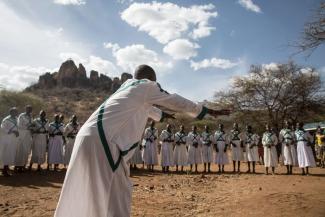Theology
Many churches, many names

Even the “I” in the English acronym may stand for a variety of ideas.
“African Initiated Churches” stresses the fact that the churches arose on the initiative of Africans. “African Independent Churches” emphasises their independence from missionary churches. “African Indigenous Churches” makes clear their cultural autonomy. The expression “African Instituted Churches” underscores the fact that they were founded and are led by Africans. This is the term the pan-African umbrella organisation OAIC (Organisation of African Instituted Churches) prefers. About one third of the AICs have joined it.
There is no scholarly consensus on whether African independent churches actually constitute a group of their own in theological terms. They are often categorised as Pentecostal or Evangelical churches. John Pobee, Thomas Oduro and John Gichimu are the most important African theologians who are shaping current discussions on the classification and social role of the AICs.
Examples of AICs include the Celestial Church of Christ in Benin, the Cherubim and Seraphim societies in Nigeria and the Zion Christian Church, which has the most members of any religious community in South Africa. In the Democratic Republic of the Congo, the most well-known AIC is the Kimbanguist Church.
The church landscape in East Africa includes the African Brotherhood Church, which developed as a self-help organisation for the people of the provincial city of Machakos, Kenya, and the Holy Spirit Church of East Africa, which is based in western Kenya. (hs)












